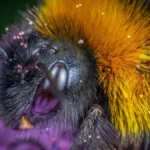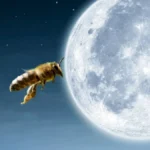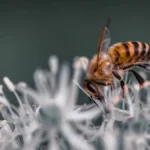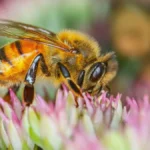Can bees see in the dark? It depends on what we call “the dark”. Bees have a similar vision capacity to us, meaning that as it gets darker, their ability to see declines to a point after which the ability to perceive anything is lost. Let us take a look at what bees see. To get to that we need to ask how do bees see?
How Do Bees See?
Bees see in such a different way to us that it is actually quite difficult to understand. Bees have two types of eyes. Compound eyes, which are like a big dome made of lots of little eyes, and then they also have three simple eyes. To see the exact way these work here is an article I wrote a while back.
So a quick summary. You can read the article in the link above if you want to go into it in depth. Bees have two compound eyes, which have thousands of small eyes that make up the compound eye. These eyes are curved over a dome. Each eye has a few receptors that can detect different colors. Bees mainly detect the change in the shapes between each eye.
To make it sound less complicated let’s look at how our eyes work. We get born, and we have big brains and two big eyes and not a clue as to how the world works. We sort of figure it out as we go along. Our big brain connects images and what people say and do and we figure out there is a Mama. Maybe a Dada. Later the brain starts to figure out that another thing that people point at is called a chair, and a desk, and within no time our big brain has figured out the way the world works.
Big Eyes Small Brains
Bees have much smaller brains and much smaller lives than us. Time is honey. They have eyes that work very well with a small brain to allow incredible decision-making. The eye is good at measuring vertical and horizontal movement. This allows bees to navigate. Its compound eyes also allow it to recognize shapes and landmarks, which allows the bee to navigate.
The eyes enable the bees to measure angles to the Sun and the angles they are flying at. This allows bees to perform a very high level of complex navigation and decision making using a relatively small brain.
Can Bees See In The Dark?
No. If we mean pure darkness no. Just like us, they have eyes that are optimized to operate during the daytime. Bees navigate using the Sun, hence, unless there is a very bright Moon at night, they are unable to navigate at night.
Can Bees Navigate At Night?
Well, we have just covered the fact that they cannot see in the dark! However, if there is a very bright Moon, and there are trees close by that have an intense honey flow, the bees will fly. I have seen bees work Eucalyptus saligna at night. It appears however that for the bees to navigate they require a very strong moon – basically full moon – and a nectar source with a strong smell.
We must also be aware of light pollution. Our electronic lights produce a lot of light pollution which enters the environment. At night, bees can mistake these lights for the Sun or Moon and will end up stuck on the lights. Lights are a big predator to bees in this way and can cause hives to lose thousands of workers per year.
If you imagine a bee navigating, it flies parallel to the Sun or Moon. If a bee flies parallel to electric light, it will spiral closer and closer to the light and will eventually get stuck on the light. Can bees see in the dark? No – but they can see lights at night, and that can kill them.
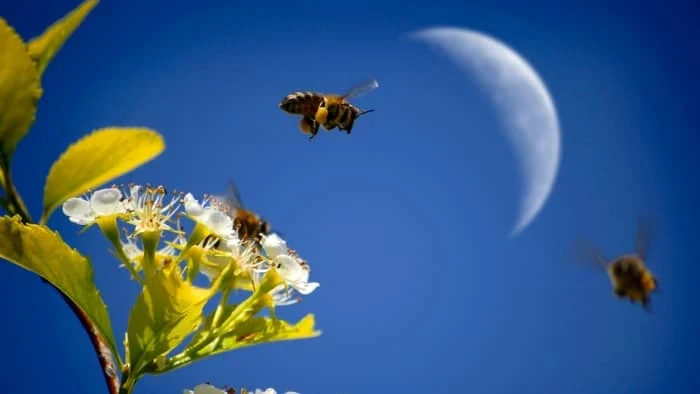
What Do Bees See?
Bees see the world so differently from us, it is almost impossible to imagine. Each compound eye has 6900 facets or small eyes. These eyes are spread over a dome shape. Bees see the movement in shape between one facet and another, which means that their world can detect lines and shapes, but not see definition. Their eyes are a navigation system, and their sense of smell helps them when they get close to their destination.
If you want to read a really interesting set of experiments, where a model was used to work out how bees forage and select targets this paper is an incredible read. The researchers very cleverly show how an animal with very limited brainpower such as a bee, and a hugely complicated eye can use this to make accurate decisions with regards to sourcing nectar.
Are Bees Blind?
This seems like a pretty weird question after what we have just spoken about above. But let us delve into it. If we look at each other, our eyes detect detail, and we use that detail to identify things. We can for instance see that one person looks different from another, or that one apple is redder than another, and so on. If we cannot make these distinguishments we would be considered blind. An example would be somebody who has a cataract that is so bad that they cannot distinguish anything clearly. They may just be able to see shadows and shapes and movement.
Bees probably see the world a bit like that. They cannot see your face and cannot tell that you look different from your friend. They can however see if you move. They can also detect what color your clothes and face and hair are. If all of your parts move at the same time, they may be able to infer that you are a single unit. Or maybe not. If they are angry they will sting something that moves.
So the answer to the question of whether bees are blind is that, technically, if they were humans they would be considered blind or at least visually impaired. Bee vision is closer to blindsight than full human vision. And that is bizarre to think about.
I hope that this article has intrigued you and helped you see that bees see in such a different way to us that by our standards they are blind and by their standards we are blind! The way bees see is a marvel of functional efficiency that uses a little brain and big eyes to solve complex problems. Truly amazing. If you enjoyed please share.
Read more about: Can Bees Fly At Night?
FAQs
1. Can bees see in complete darkness?
No, bees cannot see in complete darkness. Like humans, their vision relies on light, and as darkness falls, their ability to see decreases significantly.
2. Do bees fly at night?
Also read: How Many Bees Are In A Hive Box? Beekeeping Explained
Bees typically do not fly at night. However, on rare occasions, they may forage during a bright full moon if there is a strong nectar source, but this is uncommon.
3. How do bees navigate if they can’t see in the dark?
Bees rely heavily on the sun for navigation. In low light conditions, like under a bright moon, they can use the moon’s reflection to navigate. However, in full darkness, they cannot navigate effectively.
4. Can artificial lights confuse bees at night?
Yes, light pollution can confuse bees. Bees may mistake artificial lights for the sun or moon, causing them to fly toward these lights and potentially get stuck or disoriented.
5. What do bees see during the day?
Bees have compound eyes that allow them to detect shapes, colors, and movement. Their vision helps them recognize patterns and landmarks, which is crucial for navigation and finding flowers.
6. Are bees blind?
Technically, bees are not blind, but their vision is very different from humans. They see a less detailed world and rely more on motion detection and color contrasts than on sharpness or fine details.
7. Do bees see in color?
Yes, bees can see color, but their color spectrum is different from humans. They can see ultraviolet light, which helps them locate nectar-rich flowers, but they are unable to perceive the color red.
8. Can bees use their sense of smell in the dark?
Yes, bees have a highly developed sense of smell that helps them locate flowers and navigate to their hive even in low-light conditions or when vision is compromised.
9. How are a bee’s eyes different from a human’s eyes?
A bee’s eyes are compound, meaning they are made up of thousands of tiny lenses. These eyes are excellent at detecting movement and patterns but are not designed for seeing fine details like human eyes.
10. Can bees navigate in dim light, like at dawn or dusk?
Yes, bees can fly during early dawn or late dusk when there’s enough ambient light. Their eyes are sensitive to light changes, but they cannot see or navigate well in full darkness.

Dr. Garth A. Cambray is a Canadian/South African entrepreneur and beekeeper with 28 years of experience in apiculture and specializes in adding value to honey. His Ph.D. research developed a new advanced continuous fermentation method for making mead that has resulted in a number of companies globally being able to access markets for mead. His company, Makana Meadery, exports honey mead to the USA where it is available to discerning connoisseurs. He has also developed technologies to commercially manufacture organic honey vinegar in Zambia for export globally. He holds a few patents globally in the ethanol industry and believes in technology and knowledge transfer for human development and environmental sustainability. One of his proudest achievements is the fact that the wind farm he started at one of his old apiary sites has essentially made his hometown carbon neutral.

